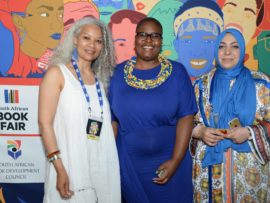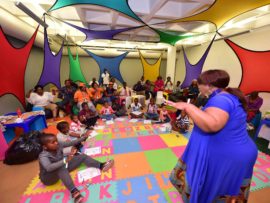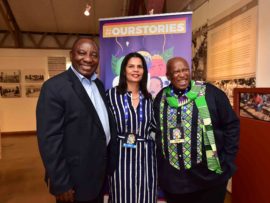Telling #ourstories to build a better South Africa
The National Book Week campaign is guided by the idea that when the nation learns to share the joy of reading books, the country benefits as this leads to empowered, self-reliant communities.

Johannesburg, South African (Wednesday, 16 May 2018) – The positive attitude towards reading amongst adults and children in South Africa has declined. Furthermore, a 2016 study conducted by the South African Book Development Council (SABDC) reported that only 14% of the population identify themselves as book readers and approximately 51% of South African households do not have a single leisure reading book.
Couple this with the fact that the 2016 Progress in International Reading Literacy Study (PIRLS) cited that 13 000 South African learners struggle to read. This is despite the fact that reading is critical to fulfilling individual potential and collective social development as it is a powerful tool to tackle poverty and inequality.
According to Elitha van der Sandt, Chief Executive Officer at SABDC, this is an alarming fact, as it means there is a generation that is unable to spread the joy and importance of reading to their own children, exacerbating the situation of children in the country who cannot read for basic comprehension in any national language.
It is in light of this that the SABDC set out on the largest national reading awareness campaign in South Africa, National Book Week (NBW) which returns for the 8th year this September from the 3rd to the 9th across South Africa.
Van der Sandt emphasises the fact that NBW is critical in highlighting the importance of reading in order to achieve success that is foundational for the individual and essential for nation building and social cohesion.
The NBW campaign is guided by the idea that when the nation learns to share the joy of reading books, the country benefits as this leads to empowered, self-reliant communities. Such an initiative reaches a diverse audience which includes pre-schoolers, learners from Grade R –12, youth, adults and even the elderly from the communities and related sectors participate in the various programme activities.
The South African Book Fair (SABF):
With its lens focused on the book trade, knowledge-sharing and skills transfer, the South African Book Fair is the culmination of National Book Week and is set to take place over a three-day period, from 07 to 09 September 2018, in the Newtown Precinct, Johannesburg under the theme #OURSTORIES.
“First and foremost, the Fair is about sharing and celebrating South African stories and those of the continent because stories have a transformative power in the minds of readers and non-readers alike,” van der Sandt explains. “This can be achieved by supplying potential readers with a pragmatic reason to pick up a book and explore the adventure in its pages. Through these campaigns, we also share with our audiences how books remind us of who we are, encourage us, instil hope in us, educate and empower us.”
On Friday, 07, the South African Book Fair will offer a variety of enjoyable activities for children in Grades 5 to 11. Such activities include sessions such as animated discussions amongst published child authors and a number of engaging storytelling events as part of the Fair’s #OURSTORIES theme. There will also be a family zone, boasting a hop on/hop off bus, magic tent, two kids’ theatre productions, a demo library and a range of interactive sessions.
Saturday 8 and Sunday 9 September will be dedicated to debates on current issues involving high profile speakers such as Mongane Wally Serote and Antjie Krog complemented by new and fascinating writing talents such as Dudu Busani-Dube and South Africa’s world-class graphic novelist Loyiso Mkize. The programme include the Keorapetse Kgositsile poetry café, in honour of the late South African poet and political activist, alongside cooking demonstrations by top-class chefs; jewels of African philosophy; and brave poets and seers.
“Sharing our stories has a uniquely unifying purpose. This is especially the case with stories without boundaries, that is stories that are created in a spirit of freedom,” she concludes.
Tickets for workshops and seminars go on sale 1 July 2018, at www.southafricanbookfair.co.za
Released on behalf of the South African Book Fair by OnPoint PR (Johannesburg).
For further information about the South African Book Fair, please visit:
Web site: www.southafricanbookfair.co.za
Facebook: www.facebook.com/SouthAfricanBookFair
Twitter: @SABookFair
Instagram: @sabookfair
For media enquiries, please contact:
Ulwazi Mgwadleka
OnPoint PR
078 764 6630
About the South African Book Fair
The South African Book Fair (SABF) is held under the auspices of the South African Book Development Council (SABDC) and is the culminating event of the annual National Book Week. Comprising a dedicated children’s day, a book exhibition, a literary festival, a dedicated B2B section and a demo library set up by Johannesburg Public Libraries, it provides a unique opportunity for engagement with writers, publishers and thought leaders, as well as an excellent platform for trade and promotion.
The SABF aims to:
- Engage children of all ages in the joy of reading;
- Present a lively and engaging literary festival;
- Provide a platform for untold stories to be told;
- Facilitate robust engagement on a range of topical issues;
- Showcase books, publishers, authors, booksellers and related industries;
- Forge and promote partnerships across the book publishing and bookselling industries, both locally and throughout Africa;
- Provide a channel for SMME development; and
- Facilitate skills and enterprise development across the entire book industry value chain.
About the South African Book Development Council
The South African Book Development Council (SABDC), formerly known as the Print Industries Cluster Council (PICC), is the representative body for the South African book publishing industry. Its members include all key stakeholders in the book publishing and bookselling value chain. Further information about the Council and its work is available at https://sabookcouncil.co.za







